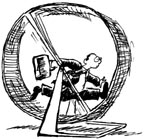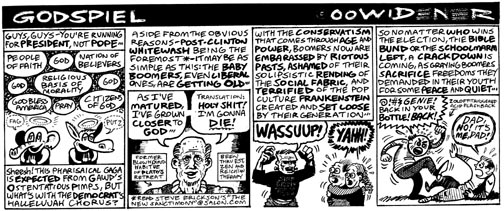Publish or Perish
I realize that the University of Kentucky has to be all about research if it's going to make it as the "next" great University [Aug 24, Cover], but it seems that somewhere within that mission there ought to be room for a philosophy that sees students as something besides a nuisance.
Having suffered through most of my first two years there with TA's who were almost as clueless as I was about the material, many of whom had not yet bothered to master English, I applaud your reporter for drawing attention to a persistent problem at UK. I didn't expect it to make teaching the number one priority that I might find at a Georgetown or a Midway, but I did expect them to make it A priority. They didn't.
A.F. Mallory
Is it an Ad? Is it a letter?
In regards to Ms. Robinson's column in the Aug. 31 issue on Morning Drive radio [In Media Res] in the Lexington market, why would anyone listen to anything else but WRVG 89.9?! WUKY is a valid alternative for those who want to hear depressing world news in the morning, but everything else is just crap and long ago lost my attention. I can't believe anyone would even bother to devote column inches to such annoying drivel.
Until WRVG appeared on the scene, I had totally abandoned the radio here in Lexington as a viable source for entertainment as I drove in my car. Now I actually turn the radio on in my house and listen to it for hours.
Lexington has no clue how lucky they are to have a radio station the caliber of WRVG. Everyone who appreciates an eclectic musical blend and hates pop-rock should support this station with every spare buck they can.
Melinda Belleville
Letters Policy: Ace LOVES to publish our mail (250 words or less please); please include name and daytime phone. No photocopies. No bulk mail. First come, first served. We may edit for space and grammar; we will limit frequency; and, on popular issues, we may print one or two letters to represent a segment of public opinion. Private correspondence should be labeled “NOT FOR PUBLICATION.”
Mail: 486 West Second St , Lexington, Ky 40507
e-mail: editor@aceweekly.com

Working for a Living
...All that was profane has been made holy. Businesspeople talk like artists. ... The zillionaires say they are in it for the self expression, not the money...Work thus becomes a vocation, a calling, a metier. And the weird thing is that when employees start thinking like artists and activists, they actually work harder for the company. In the 1960s most social theorists assumed that as we got richer, we would work less and less. But if work is a form of self-expression or a social mission, then you never want to stop. -David Brooks

A Monday off. A short work week. That's the sentimental glory that was Labor Day.
It used to mark the unofficial end of summer and beginning of school. That was when summers meant swimming pools and bottles of Sun In and sleeping till noon. Of course, summer hasn't been that leisurely for most of us since we were 12 years old.
Now you can observe any holiday gathering and at least 50 percent of the people will still be connected to their work by some sort of electronic umbilical cord.... a cell phone with wireless web, a laptop, a Palm Pilot, and anything else that'll run on a battery. Voice mail and email must be compulsively checked. Soon we'll all jack in via bioports. And if technology enables or allows us to work 24/7, odds are we will.
Who has time for a real day off? Everyone's too indispensable for that - or at least that's the perception that's being promoted. Everyone is so vital that if they were inaccessible for more than 18 seconds, the world (or certainly their office) would come to an end. Western civilization would collapse.
Everyone lives to work. Work isn't what we do, it's who we are. It's Puritan virtue elevated to art, and there are hordes of service professionals willing to act as enablers. No time for the car wash? A guy will come to your office and buff the bugs off your grill right there in the parking lot. Everything from cleaning to grocery shopping to cooking to lawn and vehicle maintenance to dog walking to childcare can be subbed out to a willing contractor.
You might as well be a brain in a jar, paying people to go about the daily activities of living your life, so you can get a few more hours on the clock, wherever you are.
David Brooks calls it "modernism for the shareholders," noting that "Berkeley-style baby boomers have become hard-working capitalists. The hedonism of Woodstock mythology has been domesticated and now serves as a management tool for the Fortune 500. Americans haven't even adopted European-style vacation schedules. Instead, they pull all-nighters at Microsoft and come in weekends at Ben and Jerry's." He describes it as a fusion of 60s liberationism and 80s enterprise which has "legitimized countercultural poses amongst the business elites [and] been fantastically good for the bottom line."
In other words, if you can figure out a way to tie someone's identity to their job, you've bought yourself a pretty good pack mule.
That is one way to look at it...
On the other hand, a little perspective might be in order here.
Because to even be able to idly ponder such self-indulgent issues as exploitation of the bourgeoisie is a pure, unadulterated luxury in this state.
Such are the "problems" of the new elite, a group for whom workaholism has become the latest extravagance.
It's the kind of speculation most Kentucky residents can ill afford.
There are 80,000 Kentuckians with jobs who earn less than federal poverty guidelines, and the number of children living in poverty in Kentucky grew steadily throughout the 90s.
According to a report by the Center on Budget and Policy Priorities and the Economic Policy Institute, the poorest 20 percent of Kentucky families are earning an average of about $11,365 a year. Our rich families earn 11 times more than our poor families, which ranks us ninth in the nation in terms of disparity. We also tax our working poor at a higher rate than most other states.
Meanwhile, the daily newspaper's housing series continues to offer relentless photos of living conditions so squalid and so foul that it seems like we're living just down the street from Calcutta's slums.
A city bureaucrat sagely advised our news writer this past spring, in response to questions about the substandard tenements in this town, "substandard people need housing too."
It's good to know they care. Even about the substandard among us.
